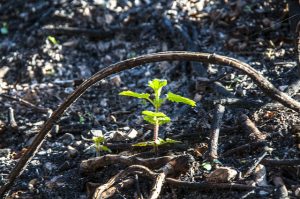Lectionary Reflection for the 13th Sunday after Pentecost, Year C
August 14, 2016
I’ve come to start a fire on this earth—how I wish it were blazing right now! I’ve come to change everything, turn everything rightside up—how I long for it to be finished! Do you think I came to smooth things over and make everything nice? Not so. I’ve come to disrupt and confront! Luke 12:49-51 (The Message)
Jesus’ emphatic opener to this week’s gospel lesson likely sounds a disconcerting note in hearers’ ears. Very few folks enjoy the prospects of judgmental and cleansing fire rolling furiously through their lives and comfort zones. We watch in horror as forest fires in the western U.S. consume homes, crops, and acres of forest land. We pray for the brave firefighters and smoke jumpers who try to control the burn, fearing for their safety. Fire is a dangerous but essential element.
Fire has the power to destroy and the power to foster regeneration and new growth. I like to think of Jesus’ fire imagery as being that of a controlled burning. Controlled burns have been around for thousands of years as a way of stewarding the land we have been called to tend. In controlled burning, firefighters, farmers, or forestry professionals intentionally start fires in grasslands, fields, forests, and woodlands to eliminate undergrowth and overgrowth that can suppress healthy vegetation, harm wildlife habitat, and provide fuel for wildfires. Controlled burning can also  replenish vital nutrients and help prevent the rogue forest fires that ravage so much land and endanger lives.
replenish vital nutrients and help prevent the rogue forest fires that ravage so much land and endanger lives.
The same “contolled burn” principle can be applied to our own lives as Christ’s disciples. Left to our own devices, our lives become easily overrun with weeds of dissension and crowded with underbrush of cultural competition and competing claims for our time, resources, and talents. We become “combustible” Christians—and not in the good sense. Rather, we risk burning out, losing our purpose and grounding, and being consumed by all the wrong things, such as hate, anger, fear, and a lack of mercy, compassion, and justice. We’re already divided and polarized along all sorts of human-constructed lines.
We need to be purified, cleansed, and made ready for new and more efficient growth. Yes, the way of the cross and our vocational call in baptism will bring its own divisions, but ultimately these divisions that disrupt and threaten to destroy the status quo will help usher in Christ’s reign of peace. We are called to controlled burn, to stewardship of faith and all aspects of life in order that this new way of living and being can flourish.
What, then, does this mean for us as individual disciples and communities of faith? We in North America don’t really face the loss of our lives or livelihoods on account of our faith. For all the talk of persecution, we still live in a pretty low-risk and low-commitment faith culture. Perhaps it means engaging in a little more faithful forecasting. What are we doing to share the good news of Jesus with a hurting and already divided world? How true are we being to our Lord’s call to follow and serve in his name and in his way?
 Yes, we know how to tell a change in the weather. We can sense in our bones and in the air when a storm is on its way. Likewise, if we truly attune ourselves to lives of faithful discipleship we can also sense when God is up to something new and how we are called to batten down our hatches, turn our faces into the wind, and run the race with perseverance that is before us. Jesus never promised an easy life of smooth sailing and perfect weather. Being faithful and following Christ means you may just get burned. But have faith! The controlled burn of faithfully forming disciples leads to real life that flourishes full of grace and mercy and peace. Lean into the wind, my friends. Don’t be afraid. You are not alone; God goes with you.
Yes, we know how to tell a change in the weather. We can sense in our bones and in the air when a storm is on its way. Likewise, if we truly attune ourselves to lives of faithful discipleship we can also sense when God is up to something new and how we are called to batten down our hatches, turn our faces into the wind, and run the race with perseverance that is before us. Jesus never promised an easy life of smooth sailing and perfect weather. Being faithful and following Christ means you may just get burned. But have faith! The controlled burn of faithfully forming disciples leads to real life that flourishes full of grace and mercy and peace. Lean into the wind, my friends. Don’t be afraid. You are not alone; God goes with you.
In Worship
Consider the practice of controlled burning. If you have a someone in your community who works in forestry, land conservation, farming, and/or fire control, invite that person to share some perspective on the practice of controlled burning. Here’s an article from the NY Times that will provide a short introduction. Here’s a US Forest Service article you may find helpful. Invite congregants to ponder what elements of congregational life and culture might benefit from a spiritual “controlled burn.” What aspects of their personal discipleship and ongoing faith formation might need to be cleansed with Holy Spirit fire? Create a litany that calls for Holy Spirit fire and cleansing.
With Youth
Long Distance Faith Race
Chances are at least some of your youth are watching this years summer Olympics in Rio. In fact, the Women’s Marathon takes place this Sunday morning, and the Men’s Marathon is next Sunday (8/21). This gives you an opportunity to talk about marathon training and preparing for long distance running. It takes effort, courage, sacrifice, faith in the process, and the willingness to fail and try again. Paul is spot-on in using this race imagery for the life of faith and faith formation in this week’s epistle lesson. If you have a marathoner in your congregation, invite her to join you and talk about training and what it takes. Invite someone who you know to have strong faith and a long history of faith to join you for the conversation and share how their faith journey has been like training for long distance running. Here’s a video about US marathoner Kara Goucher’s journey to the US Olympic Marathon trial. She finished fourth.
With Children
Weather Report
Invite the children to tell you what the weather is like today. How do they know (personal observation, weather report from internet, television, or radio)? Are storms on the way? Are drought conditions stunting growth of local crops? How can you tell when the weather is changing?
Jesus invites us to take faith forecasts, too. He wants us to be aware of what faces the church and our own faith lives. How can we do this? Again, invite answers and try to affirm them. What about prayer? Holy listening? Scripture? Conversations with other Christians? Listening to the world around us? In The Message, Jesus says, “You don’t have to be a genius to understand these things. Just use your common sense.” Invite the children to help the community discern what God is calling us to do, and then make sure that there are follow-up opportunities to hear children’s voices in the community’s discernment.
Finish with a simple prayer for “holy forecasting” for this congregation and for each disciple of every age and stage.
(Photos: US Fish & Wildlife Service, Jerry Kirkhart, and Randy Lemoine, Creative Commons. Thanks!)




Leave a Reply